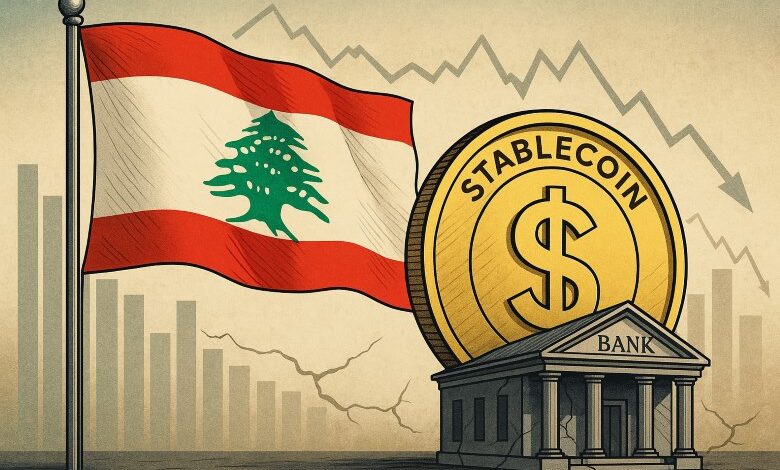Lebanon's financial crisis has turned millions into economic hostages. From frozen deposits and a collapsing currency to shattered dollar exchange rates, public trust in banks has almost evaporated. Today, the new governor of the central bank is striving to stabilize the remnants of the system, and in this context, there may be a tendency to avoid introducing new variables like stablecoins. However, in reality, pushing for stablecoin regulation may be precisely the path for Lebanon to achieve financial modernization and restore the dignity of its people.

An Irreparable System
Once hailed as the most stable banking sector in the Middle East, Lebanon's banking industry has now collapsed under its own weight. Depositors are still unable to retrieve their savings; frozen dollars in banks can only be traded at significant discounts, leading to the emergence of a parallel economy where the value of currency depends on the form and channel you hold.
The central bank's current priorities are understandable: a bank restructuring bill supported by the IMF is under negotiation, while consultations with international partners are ongoing. At this time, digital assets may seem like an additional burden. The new governor, having personally experienced the pain of this crisis, is naturally less inclined to take on more risks in an already heavy agenda.
Stablecoins Are Not Alternatives to Banks, But a New Existence
Stablecoins do not replicate traditional banking services like loans or savings. Their true value lies in: empowering people with the digital dollar sovereignty that they can freely hold and transfer. In a country where bank credit has completely collapsed, this alone is enough to bring about change.
Global regulators are also beginning to recognize this shift in role. In the United States, the recently reintroduced GENIUS Act is attempting to bring stablecoin issuers into the federal banking system, indicating their systemic importance in payments and settlements. Meanwhile, in the UAE, the central bank's payment token regulation provides a clear compliance pathway for dirham and dollar-backed stablecoins, integrating them into mainstream finance rather than the fringes.
Lebanon: A Real Case for the Necessity of Stablecoins
While developed countries are still discussing regulatory frameworks, Lebanon has already demonstrated the practical value of stablecoins in reality. According to Unlock Blockchain, Lebanon sees over $30 million in stablecoin transactions each month, primarily conducted through P2P networks and over-the-counter trading. In a country where banks have locked deposits for years, stablecoins have become a real-world alternative to the dollar, rather than just a theoretical concept.
An expert pointed out: “Stablecoins are neither a threat to monetary policy nor a tool for money laundering. On the contrary, we don’t even know how much cash in dollars is circulating within Lebanon; the central bank doesn’t know either.” In such a cash-dominated economy, promoting stablecoin regulation can bring transparency, accountability, and compliance, which are crucial for Lebanon to move off the FATF gray list.
Self-Custody: Rebuilding Trust Through Direct Ownership
For small depositors who have long lost trust in banks, stablecoins combined with self-custody wallets offer a new way to manage funds independently of any institution. This model naturally aligns with Lebanon's "cash culture"—people prefer to keep their money themselves rather than entrust it to banks.
Staking Opportunities: From Defense to Value Addition
By combining staking mechanisms with stablecoins, it can go even further: not only can it help holders resist inflation, but it can also create passive income and small investment opportunities. In a country where ordinary people have little access to financial products, this would transform stablecoins from mere protective tools into engines of economic resilience.
More Than Just Cross-Border Remittances
While cross-border payments remain the most direct and reasonable application scenario for stablecoins—Lebanon receives $6 to $7 billion annually from expatriates—its greater potential lies in: building a truly people-centered financial system, rather than one that only serves institutions. Such a system should be based on transparency, portability, and individual sovereignty.
The Governor's Choice: Maintain the Old System or Move Towards Modernization?
It is understandable that the Central Bank of Lebanon is currently reluctant to open the topic of stablecoin regulation. Concerns about regulatory complexity, illegal fund flows, and pressure from public expectations are real. But another question arises: If not stablecoins, what exactly should be rebuilt? The already collapsed old banking system? Or should we embrace stablecoin regulation and accept solutions that better align with Lebanon's realities of globalization, liquidity, and resilience?
Digital Assets: Lebanon Cannot Continue to Be Disconnected
Digital assets go far beyond stablecoins. Bitcoin has proven its ability as a store of value globally, but most Lebanese people have no opportunity to access it. Instead, they were misled into buying high-yield deposit products or investment plans, ultimately losing everything when institutions collapsed overnight.
Lebanon is not an island. In an era where global capital markets are opening up to the public through tokenized stocks and digital assets, Lebanon remains stuck in the past, protecting the vested interests that created the crisis. If there is no accountability, that may pass, but continuing to allow them to enjoy existing rights and advantages is not just negligence—it is another crime against the people.
Lebanon does not need another fragile banking patch; it needs a financial reboot—a system built on transparency, interoperability, and trust. Stablecoins, self-custody, staking mechanisms, and broader acceptance of digital assets may seem like "troublemakers" disrupting the status quo today, but they could very well be the only path to a truly usable financial future for the people of Lebanon.
免责声明:本文章仅代表作者个人观点,不代表本平台的立场和观点。本文章仅供信息分享,不构成对任何人的任何投资建议。用户与作者之间的任何争议,与本平台无关。如网页中刊载的文章或图片涉及侵权,请提供相关的权利证明和身份证明发送邮件到support@aicoin.com,本平台相关工作人员将会进行核查。




